- Home
- Richard Lee Byers
The Haunted Lands: Book II - Undead Page 3
The Haunted Lands: Book II - Undead Read online
Page 3
Fortunately, it was easy for the disciple to resolve his dilemma. He only had to do as Hezass requested and fetch Iphegor Nath.
The High Flamelord arrived with a handful of monks in tow. He was a tall man with craggy, commanding features. His muscular physique, the uncanny glow of his orange eyes, and the tiny flames that crawled on his shaved scalp and shoulders all combined to make him resemble the traditional depiction of the deity he served. His simple attire stood in marked contrast to Hezass’s gemmed and layered vestments, for, most likely roused from his bed, he’d only taken the time to pull on breeches, sandals, and a shirt.
Hezass dropped to his knees and lowered his eyes. Iphegor let him remain that way for a long time.
Finally, the High Flamelord broke the silence. “You realize, I’m going to drown you.”
Inwardly, Hezass winced. “Drowning is the traditional punishment for an apostate, Your Omniscience, and thus inappropriate for me. I walked through the god’s domain to come here. How could I do that if I’d renounced my priesthood?”
“You renounced the church,” Iphegor growled. “You renounced me.”
“With all respect, Your Omniscience, that is incorrect. I freely acknowledge your supreme authority … in matters of theology. The matter of who should govern Thay is a political question.”
“And your answer is—the creature whose treachery slew scores of the Firelord’s priests.”
“I confess, I made an error. I’ve come here to rectify it.”
“By sneaking an armed force into the temple.”
“What, these?” Hezass waved his hand at the golems standing like statues behind him. “They have their uses, but it’s laughable to think that four of them could prevail against all the magic and armed might protecting the Flaming Brazier. I simply wanted to present myself with the dignity an escort affords. Now, do you truly intend to keep me on my knees for the entire parley, and to conduct it in the hearing of these good monks? I’m sure they’re pious and loyal, but even so, it would be indiscreet.”
“Get up,” Iphegor said. “We can talk in the chapel over there. Leave your puppet bowmen outside, and I’ll do the same with the monks.”
A statue of Kossuth bestowing the gift of fire on humanity dominated the shrine. The golden light of votive fires gleamed on the crimson marble. In the mosaic on the wall, the god presided over a court of red dragons, efreet, and other creatures whose natures partook of elemental flame.
“So,” Iphegor said, seating himself on a bench, “how do you propose to atone for your sins?”
Since the High Flamelord hadn’t given him leave to sit, Hezass remained standing as he explained his proposal.
When he finished, Iphegor stared at him for several heartbeats, until Hezass, who’d just negotiated the Plane of Fire without discomfort, felt sweat starting to ooze under his arms. Finally, the big man said, “You string words together as glibly as ever. But after all the lies you’ve told over the past ten years, how can you possibly expect anyone to believe you?”
“I’ve already explained that my link with our god remains intact. How could I not desire reconciliation with the head of my faith?”
Iphegor snorted. “How many times have I offered my forgiveness, only to have you wipe your arse on it by slinking back to Szass Tam? I’ve lost count.”
“I confess. I’ve maneuvered for power and wealth. I’ve put my own welfare ahead of every other concern, doing whatever seemed necessary to survive amid a war of wizards. Which makes me no worse than many other nobles and officials in Thay. But I know that’s not the man I want to be. I want to be steadfast and honorable and worthy of the god we serve.”
“That would be inspiring if I thought you meant it.”
Hezass sighed. “If you can’t believe I’ve had a change of heart, perhaps you’ll credit this. The Council currently occupies a goodly portion of eastern Lapendrar. I’d like those lands back, and in reasonable condition.”
“And you doubt Szass Tam’s ability to recover them?”
“He may succeed, or he may not. Even if he does, I don’t approve of the way he’s conducting the war. I understand the strategic points of causing flood and drought, slaughtering peasants, and poisoning the soil, rain, and streams. Since his legions are largely undead, the resulting scarcity of food hurts his enemies more than it injures him. But what will be left of the realm after he wins? I don’t want to live out my days as the pauper governor of a ruined province. I want the old Thay back!”
Iphegor grimaced. “As do I. So I’ll tell you what I’ll do. I still don’t trust you, but I will ask the Council to listen to your blandishments. They can make up their own minds about you.”
Aoth steeled himself for an ordeal. When convening for a council of war, the zulkirs sometimes commanded the attendance of their tharchions, whisking them to the site of the meeting by magical means. The military governors, in turn, made it a habit to bring a trusted lieutenant or two, which meant Nymia Focar occasionally dragged Aoth along.
He supposed he should be used to it, but after all these years, he never felt fully at ease in the presence of the notoriously cruel and capricious wizard lords. It didn’t help that, of everyone in the hall, with its long red wooden table and jeweled crimson banners hanging from the rafters, he was the only person who didn’t look like a proper Mulan.
Still, the zulkirs probably deserved commendation for possessing the prudence to seek advice, especially considering that the council was less than it once had been. Not that there was any real shortage of intelligence. The bloated Samas Kul, shrewish Lallara, clerkish Lauzoril, glowering Nevron with the brimstone stink emanating from his person, and the comely Dmitra Flass were as shrewd as anyone could wish. But Kumed Hahpret, who’d succeeded the murdered Aznar Thrul as zulkir of Evocation, and Zola Sethrakt, representing what little remained of the necromancers after Szass Tam suborned most of the order to fight on his behalf, had proved to be less impressive intellects than their predecessors. And the chair once occupied by the traitorous Yaphyll sat empty. The Order of Divination hadn’t yet elected a leader to replace her.
Aoth stiffened when Iphegor Nath ushered Hezass Nymar into the chamber. The fire priest’s faithlessness had, on more than one occasion, cost the Griffon Legion good men and mounts. But Aoth couldn’t vent his anger in such an assembly, at least not yet. He had to sit quietly while Hezass spoke his piece.
When the whoreson finished, the zulkirs sent him out of the room under guard. “Well,” said Dmitra, who often acted as presiding officer, to the extent that the other haughty zulkirs would tolerate, “what do you think?”
“Question him under torture until he dies of it,” Lallara said. Powerful as her magic was, the zulkir of Abjuration could easily have erased the outward signs of advancing age, but had instead allowed time to cut lines and crow’s feet and loosen the flesh beneath her chin. It made her bitter manner all the more intimidating.
Dmitra smiled. “That’s my first impulse, also, but I wouldn’t want to waste a genuine opportunity. Your Omniscience, what’s your opinion? What game is Nymar playing this time?”
Iphegor frowned. “Your Omnipotence, I wish I knew. Much as it irks me to admit it, he hasn’t lost his connection to the Lord of Flames. He’s still a priest, and it’s possible he wishes to mend his quarrel with me, just as he asserts. In addition, I find his claim that he only ever served Szass Tam to achieve a life of opulent wealth, and that he fears that such an existence is slipping forever beyond his reach, to be plausible. Still, there’s no disputing the man’s a treacherous worm. Who knows where his allegiance really lies, or where it will reside tomorrow?”
“Not I,” said Samas Kul. If Hezass was in fact motivated by avarice, he ought to sympathize, for, taking full advantage of his position as Master of the Guild of Foreign Trade, he’d made himself the richest man in Thay even before his ascension to leadership of the transmuters. His red robes reflected the fact, for they glittered with more gems and precious metal tha
n any of the other costly attire on display in the chamber. Unfortunately, even the finest raiment couldn’t make his obese, sweaty, ruddy-faced form attractive.
Lauzoril pursed his lips and pressed the fingertips of his hands together to make a pyramid. “The important question,” the zulkir of Enchantment said in his dry tenor, “isn’t whether Hezass is a scoundrel, but whether his information is accurate. If so, then as Dmitra Flass observed, we may have a chance to win a meaningful victory at last.”
“I concur,” Nevron said, scowling so fiercely that anyone who hadn’t heard his words might have assumed he disagreed. A number of his tattoos took the forms of hideous faces, the countenances of the demons and devils that, as a master conjurer, it was his particular art to command. “Szass Tam descends from the heights to lay siege to the Keep of Sorrows. We swing an army in behind him. They’ll be the hammer, and the castle and the edge of the cliffs, the anvil. We’ll pound the necromancers, and they won’t be able to retreat.”
“You can’t count on Nymar to bring the troops he pledges,” Samas said. “He’ll keep them in their garrisons to protect the lands he still holds, and afterward, claim sickness in the ranks prevented them from marching. Or else, that his scouts reported Aglarondan troops maneuvering on the western border, and he had to leave his men in place to protect against a possible invasion. He’s done it before.”
“I remember,” Dmitra said. “He doesn’t much care to ride heroically into battle, does he? But if we can prevail on him to bring his army as far as the western bank of the River Lapendrar, to make certain Szass Tam can’t maneuver in that direction, that in itself would be a help.”
“Right,” Nevron said. “We can do the real work ourselves, if we commit enough of our own strength.”
Samas responded, as well as Lallara, in much the same vein. Before long, it became clear to Aoth that, without bothering to say so overtly, the zulkirs had decided on a strategy. Now they were discussing how best to implement it.
Aoth gnawed his lower lip. In theory, he and the zulkirs’ other subordinates were present to provide their opinions, and he would have preferred to hold his tongue until someone specifically asked for his perspective. But it didn’t seem that any of the mage lords meant to do so.
Wishing he were somewhere else, he cleared his throat. “Masters?”
The zulkirs all turned to regard him, some more coldly than others, but none with extraordinary warmth. “Yes, Captain?” Dmitra said.
“I think,” said Aoth, “we should evaluate Hezass Nymar’s claims carefully, and not just because he’s a known traitor and liar. I realize that many of you have magic to determine whether a man is speaking the truth as he understands it, and I imagine you’ve applied those tests in this instance. But on the face of it, the scheme he’s attributing to Szass Tam makes little sense.”
“Why?” Nevron asked. “The Keep of Sorrows is an important fortress. If he takes it, it will be far easier for him to strike into Tyraturos, and if he’s successful there, it opens the High Road for incursions into Priador.”
“Yes, Your Omnipotence,” said Aoth, “if he’s successful. But the keep is generally considered impregnable, or nearly so. Until now, Szass Tam has only undertaken major battles and sieges under conditions advantageous to himself. Most of the time, he picks away at us, raiding, burning crops and granaries, killing a few folk here and there to raise as zombies and swell the ranks of his legions. He’s been slowly tipping the balance in his favor, as if—as Hezass Nymar suggested—he doesn’t care how long it takes to win, or what condition the realm is in when he does. Why, then, would he suddenly change tactics and commit his troops to such a reckless venture?”
“Because he’s grown impatient,” Lallara said, “and made a mistake. The wretch isn’t infallible, whatever you and fools like you may imagine.”
Aoth glanced at Nymia Focar in the forlorn hope that his superior would support him. She was an able warrior and capable of seeing the sense in what he was saying. But, as he expected, she gave him a tiny shake of her head, warning him to desist. The motion made the silver stud in her left nostril flash with a gleam of lamplight and the rings in her ears clink faintly.
He wished Malark were present. Dmitra often heeded his opinion, but hadn’t seen fit to bring him. Perhaps he was busy with some other task.
Milsantos Daramos might also have spoken on Aoth’s behalf, for the former tharchion of Thazalhar had been both the canniest and the bravest Thayan general in recent memory. Unfortunately, he’d succumbed to old age three years back.
In the absence of such men and the counsel they might have offered, Aoth stumbled on alone. “I understand that the lich is capable of miscalculating. Everybody is. But I still worry that there’s something about this situation we don’t understand.”
Samas grunted. It made him seem even more swinish, if that was possible. “You realize, Captain, that if the lich marches on the Keep of Sorrows, we have no choice but to defend it. Unless you advocate simply opening the gates and surrendering.”
Aoth clamped down hard to keep resentment from showing in his face or tone. “Of course not, Master. But the keep should be able to resist a siege for a considerable time. We needn’t be in a hurry to commit the bulk of our forces to defend it, and we needn’t look to Nymar for anything. We can proceed cautiously.”
“And perhaps lose the castle as a result,” Lallara rapped. “Perhaps even forfeit the opportunity to win the war.”
“Which is something,” Dmitra said, “we cannot afford. You said it yourself, Captain, more or less. Time is on Szass Tam’s side. We must defeat him while we’re still strong.”
Aoth inclined his head. “Yes, Your Omnipotence. I understand.”
Tammith Iltazyarra winged her way through the night sky as a flock of bats, the lights of Escalant shining below. The sea reflected Selûne’s crescent smile, and the haze of glittering tears that followed her, like an obsidian mirror. Tammith’s inhuman senses registered the sea in somewhat the same way that a living person might discern the presence of a wall or cliff face looming close. She didn’t merely see it, but felt it as a confining pressure. It exerted a force upon her, because no vampire could cross open water.
Once upon a time, her transformation into a swarm of leathery-winged beasts would have significantly altered her consciousness. The human—or quasi-human—Tammith was prey to shame and regret, and the bats were not. But it had been a long while since such feelings troubled her in any of her various guises. She supposed that meant she truly was dead now, and she was glad of it. Existence was easier this way.
Their shrill cries echoing from roofs and walls to guide them, the bats flew into an alley, checked a final time to make sure no one was watching, then swirled together. In a moment, they merged to become a petite, dark-haired woman in a plain cloak and gown. In other circumstances, she would have worn a sword and mail, but she didn’t feel vulnerable without them. Her most formidable weapons were always with her. Xingax, curse him, had seen to that.
She walked onward, through streets that were busy even after dark, because Escalant was a thriving port. Though under Thayan governance, it was a colony, geographically removed from the realm proper, and as a result, the zulkirs’ war had yet to blight it. In fact, the contented faces, well fed and unafraid, the music and laughter sounding from the taverns, and the scarcity of soldiers reminded her of Bezantur as it had been when she was alive. Something stirred inside her, some vague approximation of melancholy or nostalgia.
Then the temple of Kossuth came into view, and she quashed the feeling, whatever it was, to focus on the task at hand.
Like all the Firelord’s houses of worship, this one was a ziggurat, built of blocks of cooled lava. Fires burned on either side of the door, on the terraces leading upward, and at the apex of the pyramid.
Tammith again felt a pressure, because the flames were the sacred symbols of Kossuth, and although no priest was trying to use their power to repel her, there were plen
ty of them, and more holy force, concentrated inside the temple.
Still, since the ziggurat was a public place, it should be possible for her to enter. It would simply take spiritual strength and resolve.
As she advanced, Tammith fought the urge to lean forward as if she were struggling against a strong wind. Her skin grew hotter and hotter.
She stumbled as she climbed the steps to the entrance. Fortunately, the two warrior monks standing guard at the top didn’t take any notice. Perhaps they were used to the sick and the lame hobbling up to pray to the god for healing.
Grimacing with effort, she forced herself across the threshold, and then the pressure and heat abated. Wherever she looked, more fires burned, altars stood piled with offerings, and images of Kossuth glowered at her, so the aversive sensations didn’t vanish entirely. But it seemed that by coming this far and asserting her supremacy, she’d heightened her resistance. She should be able to bear the unpleasantness for a time.
She reached out with her mind, and the results were disappointing. The priests and monks evidently did a good job of waging war against rats, or perhaps the rodents simply found the pyramid with its hard stone walls and scores of open fires uncongenial. But every large structure provided a home for at least a few such vermin, and she summoned them to rendezvous with her as she prowled onward, doing her best to look like a worshiper heading for her favorite shrine or chapel.
The ruse lost its utility when she reached the staircase leading up. The higher reaches of the temple were closed to everyone but clerics and monks. Before continuing onward, another vampire might have become a bat or rodent to make himself less conspicuous. But Tammith could only transform into a cloud of bats or a scurrying carpet of rats. Those guises were more likely to attract attention than a single human figure, and the same was true of a hulking wolf, or billows of mist flowing along in the absence of a breeze. Best, then, simply to slink on two feet.

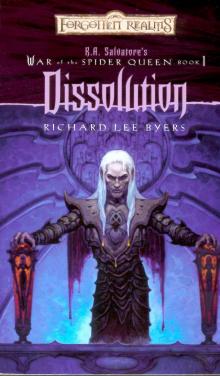 Dissolution
Dissolution Arkham Horror- Ire of the Void
Arkham Horror- Ire of the Void The Haunted Lands: Book II - Undead
The Haunted Lands: Book II - Undead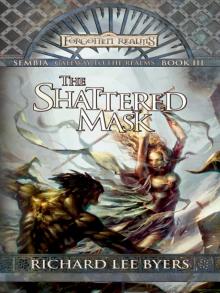 The Shattered Mask
The Shattered Mask Dark Kingdoms
Dark Kingdoms The Masked Witches: Brotherhood of the Griffon, Book IV
The Masked Witches: Brotherhood of the Griffon, Book IV The Plague Knight and Other Stories
The Plague Knight and Other Stories Unclean: The Haunted Lands
Unclean: The Haunted Lands The Captive Flame: Brotherhood of the Griffon • Book 1
The Captive Flame: Brotherhood of the Griffon • Book 1 The Taste of Waterfruit and Other Stories (Story Portals)
The Taste of Waterfruit and Other Stories (Story Portals)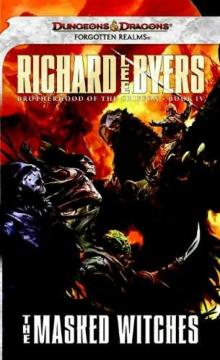 The masked witches botg-4
The masked witches botg-4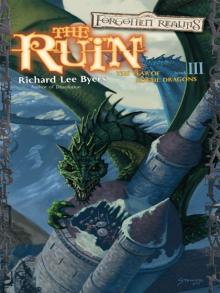 The Ruin
The Ruin The Spectral Blaze botg-3
The Spectral Blaze botg-3 The Masked Witches
The Masked Witches Blind God's bluff bf-1
Blind God's bluff bf-1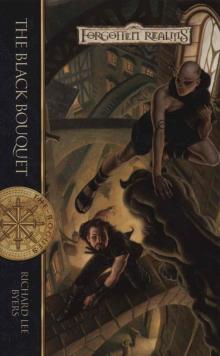 The Black Bouquet r-2
The Black Bouquet r-2 The Rite
The Rite Prophet of the Dead: Forgotten Realms
Prophet of the Dead: Forgotten Realms The Shattered Mask s-3
The Shattered Mask s-3 Called to Darkness
Called to Darkness Undead hl-2
Undead hl-2 Blind God's Bluff: A Billy Fox Novel
Blind God's Bluff: A Billy Fox Novel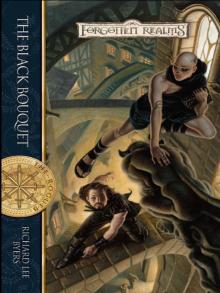 The Black Bouquet
The Black Bouquet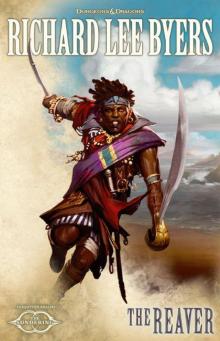 The Reaver
The Reaver The Spectral Blaze: A Forgotten Realms Novel
The Spectral Blaze: A Forgotten Realms Novel Queen of the Depths
Queen of the Depths Prophet of the Dead botg-5
Prophet of the Dead botg-5 Whisper of Venom: Brotherhood of the Griffon, Book II
Whisper of Venom: Brotherhood of the Griffon, Book II The Captive Flame botg-1
The Captive Flame botg-1 The Haunted Lands: Book III - Unholy
The Haunted Lands: Book III - Unholy Prophet of the Dead
Prophet of the Dead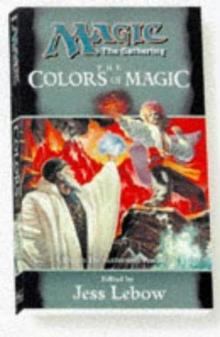 The Colors of Magic Anthology (magic: the gathering)
The Colors of Magic Anthology (magic: the gathering) Unholy hl-3
Unholy hl-3 Unclean hl-1
Unclean hl-1 Blind God's Bluff
Blind God's Bluff Whisper of Venom botg-2
Whisper of Venom botg-2 The Spectral Blaze
The Spectral Blaze